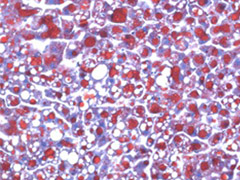Metabolic Research
Causes of cortisone-induced side effects identified
01.02.2019
Patients undergoing long-term treatment with steroids may suffer from metabolic side effects. An international team of researchers has now pinpointed a mechanism that leads to so-called steroid diabetes.
"Glucocorticoids such as cortisone have been used to treat inflammatory diseases such as asthma or rheumatism for many decades, and they are the most commonly prescribed anti-inflammatory drugs,” explains Prof. Henriette Uhlenhaut, Group Leader at the Gene Center and the Institute for Diabetes and Obesity (IDO) at the Helmholtz Zentrum München. “They are also frequently used in autoimmune diseases, organ transplantations and cancer. It is estimated that between one and three percent of the Western population are currently receiving these drugs - which corresponds to more than one million Germans alone.
However, although glucocorticoids are prescribed for a wide range of conditions, their use is limited by the various side effects – including unwanted metabolic effects – that can occur during treatment. Once the glucocorticoids bind to their receptor inside the cell, the receptor starts switching numerous genes on and off. “These include various metabolic genes, which can consequently cause so-called steroid diabetes,” Henriette Uhlenhaut explains.

In the current study, her team – together with colleagues from the Max Delbrück Center for Molecular Medicine in Berlin, the Salk Institute in San Diego and the University of Freiburg – set out to identify the exact sequence of events that occurs once the steroids bind their receptor.
Publication:
E47 modulates hepatic glucocorticoid action
Hemmer MC, Wierer M, Schachtrup K, Downes M, Hübner N, Evans RM, Uhlenhaut NH.
Nat Commun. 2019 Jan 18;10(1):306. doi: 10.1038/s41467-018-08196-5.
Figure: Steroid treatment can trigger metabolic changes such as a fatty liver (shown here) via the transcription factor E47. Source: Helmholtz Zentrum München
For more information please visit LMU.de/news
Publication:
E47 modulates hepatic glucocorticoid action
Hemmer MC, Wierer M, Schachtrup K, Downes M, Hübner N, Evans RM, Uhlenhaut NH.
Nat Commun. 2019 Jan 18;10(1):306. doi: 10.1038/s41467-018-08196-5.

